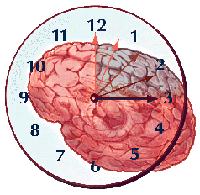Joyce So, BSc
While thrombolytic therapy has become an established part of treatment for acute ischemic heart disease, the controversy continues regarding its potential and practical use in acute ischemic stroke. In a situation where time is of the essence, is thrombolysis the best available solution?
 Acute ischemic stroke (AIS), or "brain infarction", is most commonly a result of intracerebral artery occlusion due to embolism from proximal sites such as the internal carotid arteries, heart or aorta. Unlike cardiac arrest, where brain viability is measured in minutes, AIS presents with a mixture of salvageable tissue, allowing for a therapeutic window that can last several hours. While the definitive time frame has yet to be pinned down, the generally accepted mantra "Time is Brain" reflects the notion that prognosis is improved by early intervention. The question now is whether there is a role for thrombolytic therapy in the management of AIS.
Acute ischemic stroke (AIS), or "brain infarction", is most commonly a result of intracerebral artery occlusion due to embolism from proximal sites such as the internal carotid arteries, heart or aorta. Unlike cardiac arrest, where brain viability is measured in minutes, AIS presents with a mixture of salvageable tissue, allowing for a therapeutic window that can last several hours. While the definitive time frame has yet to be pinned down, the generally accepted mantra "Time is Brain" reflects the notion that prognosis is improved by early intervention. The question now is whether there is a role for thrombolytic therapy in the management of AIS.
The two most prominent candidates for use in thrombolytic AIS therapy are streptokinase and recombinant tissue plasminogen activator (rtPA), both serine proteases that catalyze the conversion of plasminogen to plasmin, which digests fibrin clots.

 Acute ischemic stroke (AIS), or "brain infarction", is most commonly a result of intracerebral artery occlusion due to embolism from proximal sites such as the internal carotid arteries, heart or aorta. Unlike cardiac arrest, where brain viability is measured in minutes, AIS presents with a mixture of salvageable tissue, allowing for a therapeutic window that can last several hours. While the definitive time frame has yet to be pinned down, the generally accepted mantra "Time is Brain" reflects the notion that prognosis is improved by early intervention. The question now is whether there is a role for thrombolytic therapy in the management of AIS.
Acute ischemic stroke (AIS), or "brain infarction", is most commonly a result of intracerebral artery occlusion due to embolism from proximal sites such as the internal carotid arteries, heart or aorta. Unlike cardiac arrest, where brain viability is measured in minutes, AIS presents with a mixture of salvageable tissue, allowing for a therapeutic window that can last several hours. While the definitive time frame has yet to be pinned down, the generally accepted mantra "Time is Brain" reflects the notion that prognosis is improved by early intervention. The question now is whether there is a role for thrombolytic therapy in the management of AIS.